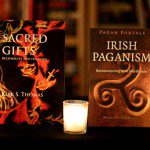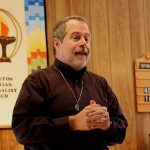Although the American holiday of Thanksgiving began in a very Christian context, the idea of a harvest feast and of giving thanks for the good things in life is far older. All of us enjoy much in life we did not create and did not earn, from the air and water and sunlight that support life, to the infrastructure that supports our society, to the families of blood and of choice that supported us when we were young and helpless, and that will support us again when we are old and frail. These gifts create obligations for reciprocity, whether that means paying back or paying forward.
But the first obligation of any gift is to say “thank you.” And so as we approach Thanksgiving Day, I’d like to express my thanks for the Pagan community.
Yes, this immature, frustrating, constantly infighting collection of cats that are impossible to herd. I’m thankful for it.
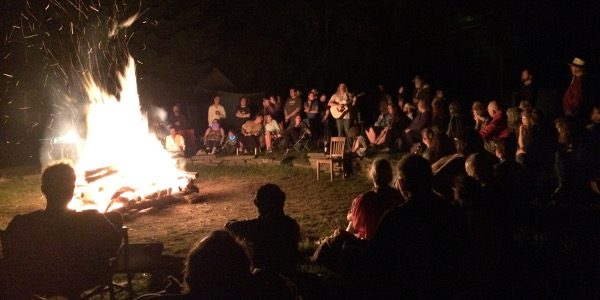
I’m thankful I’m not alone. I remember being 10 or 12 or so, sitting in a pew in the small Baptist church where my parents took me, and feeling so alone. I couldn’t believe what I was told I had to believe, and the services didn’t inspire me to do anything other than mentally rebut them as they were happening. And yet everybody else took it as unquestioned truth. Even my friends who attended more moderate churches never challenged the exclusivist claims of orthodox Christianity. Was I the only one who could see the problems?
It took a while to find my spiritual home. Or homes, to be more precise. I’m thankful I’ve found other people who define themselves not by what they aren’t, but by what they are. I’m thankful I’ve found others who value Nature, and our ancestors, and the Many Gods. We don’t always agree, but at least I don’t have to go it alone.
I’m thankful for the friends I’ve made. Through this blog and through social media I’ve made many friends with whom I share religious and spiritual belief and practices, and I’m thankful for all of them. But I’m especially thankful for the Pagans – both local and distant – who have become my close friends. These are the people I do ritual with, talk to when I have concerns, and celebrate with when I have good things in my life. These are the people I travel with and travel to see. They’re the people I’d do pretty much anything to help, and I know they’d do the same for me. Were it not for the Pagan community, I would know none of them.
I’m thankful for the education I’ve received, and continue to receive. There is a certain intuitive spirituality to Paganism, but intuitive spirituality will only take you so far. There is history and theology and philosophy we need to learn, there are magical and spiritual practices with a long track record of producing effective results, and there are sacred traditions that are passed down in special ways. Without a Pagan community, I would have learned none of this. Even the books that have meant so much to Pagans since the 1980s would never have been published if there wasn’t a Pagan community to buy them.
Individual traditions have their own programs: OBOD has the best distance learning program in the Pagan world and ADF’s Dedicant Program is also excellent. The various Witchcraft traditions have their own training programs ranging from structured and formal to highly individualized. I’ve received a great education, and I continue to learn from the writers, teachers, and practitioners who share their work.
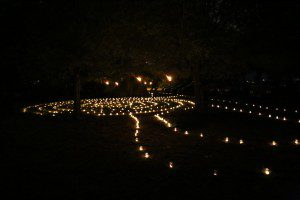 I’m thankful for our local groups and gatherings. After years of working solitary, I thought I understood Paganism. Then I went to Denton CUUPS’ Imbolc Circle and had what was quite literally a magical experience. There are things you can do in a group you simply can’t do on your own.
I’m thankful for our local groups and gatherings. After years of working solitary, I thought I understood Paganism. Then I went to Denton CUUPS’ Imbolc Circle and had what was quite literally a magical experience. There are things you can do in a group you simply can’t do on your own.
I’m thankful for the Maypoles and the Spiral Labyrinths. I’m thankful for the stories we’ve told and the Gods we’ve honored. And I’m especially thankful for the small groups of Pagans who have gathered for the deeper work that is only possible in a place of honesty, vulnerability, and trust.
I’m thankful for our large gatherings. We are Pagans, but we live and breathe in a nominally Christian society that worships money and things. There is nothing like spending a long weekend immersed in Paganism, whether that’s in a hotel environment like Pantheacon or (even better) in the woods like the OBOD East Coast Gathering. This is an opportunity to drop the masks, be who we are, and have the kind of deep, intimate religious experiences and conversations we simply can’t have anywhere else.
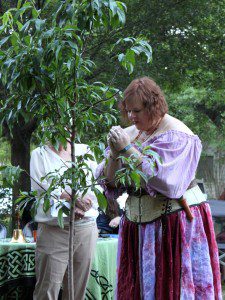 I’m thankful for our worship. Worship comes from an Old English word meaning worthiness and respect. Our Pagan worship affirms the worthiness of the Gods, our ancestors, and the spirits of Nature. It stands in opposition to those who believe worship requires self-debasement and chanting sycophantic praises to an insecure deity. It also stands in opposition to those who worship their own egos and who see other people and other species as things to be exploited for their own gain.
I’m thankful for our worship. Worship comes from an Old English word meaning worthiness and respect. Our Pagan worship affirms the worthiness of the Gods, our ancestors, and the spirits of Nature. It stands in opposition to those who believe worship requires self-debasement and chanting sycophantic praises to an insecure deity. It also stands in opposition to those who worship their own egos and who see other people and other species as things to be exploited for their own gain.
At its core, Pagan worship is about forming and strengthening relationships with what – and with Who – matters most.
I’m thankful for our influence on the wider society, no matter how small. The modern Pagan movement is, in part, a reaction to the excesses of monotheistic religion and the desecrations of the Industrial Revolution. Much of what we do tends to our own needs and the needs of our fellow Pagans. But through our active work and through our presence as an alternative, we are slowly but surely changing the mainstream culture for the better. We will not see a Nature-loving, Gods-honoring, community-based society in our lifetimes, but we are moving in that direction. We are earning our places as the ancestors of the future.
So as you gobble your turkey and say your prayers of gratitude next Thursday, remember to give thanks for our Pagan community. It’s a difficult community and often a frustrating community, but it’s a good community and I’m glad we’ve got it.


